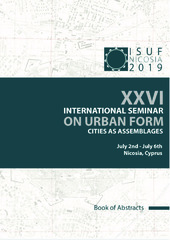Приказ основних података о документу
“Plot by plot urbanism”. Mapping post-socialist changes in urban tissues of Krakow and Belgrade
| dc.creator | Kantarek, Anna | |
| dc.creator | Djokic, Vladan | |
| dc.creator | Kwiatkowski, Krzysztof | |
| dc.creator | Niković, Ana | |
| dc.creator | Korbel, Wojciech | |
| dc.creator | Djordjevic, Aleksandra | |
| dc.creator | Samuels, Ivor | |
| dc.date.accessioned | 2023-11-28T09:33:26Z | |
| dc.date.available | 2023-11-28T09:33:26Z | |
| dc.date.issued | 2019 | |
| dc.identifier.uri | https://raf.arh.bg.ac.rs/handle/123456789/1708 | |
| dc.description.abstract | Political ideologies of the Soviet Union resulted in deep cultural and economic transformations in post WWII Poland and Serbia (Ex-Yugoslavia) including profound changes to urban space and planning. Time of war destruction, neglect of inherited urban structures and the modernist doctrine of urban development led to functional zoning based on modernist spatial concepts. Accordingly, social systems led to land nationalization, elimination of private property resulting in centralized city planning and especially large urban housing complexes. Political changes at the end of the twentieth century returned to policies based on democratic systems and a decentralized economy with private land ownership. After nearly 30 years (Poland) and 15 years (Serbia), it is possible to see successes and failures in the system and the implementation of spatial changes. Faced with today's challenges to implement sustainable solutions, post-socialist cities must respect the existing urban structure while achieving the best possible use of existing investment. This paper aims to present the first findings of the project on post-socialist urban form currently being undertaken with the support of ISUF, Faculty of Architecture-University of Belgrade and Cracow University of Technology. Through the historical evolution and a general analysis of the planning contexts, a comparative discussion will be focused on understanding the characteristics of the current urban form. Research on particular cases, Krakow and Belgrade, can not only help to reveal varieties of conditions to which similar urban tissues have been exposed but can also open up methodological discussion on tools and technics for reading post-socialist urban form. | sr |
| dc.language.iso | en | sr |
| dc.publisher | Nicosia: CNUM - Cyprus Network of Urban Morphology | sr |
| dc.relation | info:eu-repo/grantAgreement/MESTD/Technological Development (TD or TR)/36035/RS// | sr |
| dc.rights | openAccess | sr |
| dc.source | XXVI International Seminar on Urban Form Conference (ISUF2019) Cities as Assemblages : book of abstracts, 2-6. July, 2019., Nicosia, Cyprus. | sr |
| dc.subject | urban form | sr |
| dc.subject | urban morphology | sr |
| dc.subject | post-socialist development | sr |
| dc.subject | Krakow | sr |
| dc.subject | Belgrade | sr |
| dc.title | “Plot by plot urbanism”. Mapping post-socialist changes in urban tissues of Krakow and Belgrade | sr |
| dc.type | conferenceObject | sr |
| dc.rights.license | ARR | sr |
| dc.citation.spage | 163 | |
| dc.citation.epage | 163 | |
| dc.identifier.fulltext | http://raf.arh.bg.ac.rs/bitstream/id/5263/bitstream_5263.pdf | |
| dc.identifier.rcub | https://hdl.handle.net/21.15107/rcub_raf_1708 | |
| dc.type.version | publishedVersion | sr |

